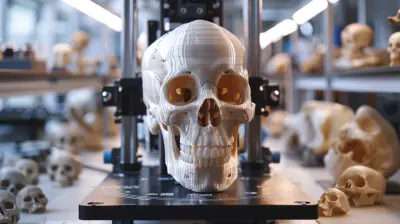Unraveling the Mysteries of Quantum Computing: A Beginner's Guide
17 July 2025
Quantum computing sounds like something straight out of a sci-fi movie, right? Well, it's real, and it has the potential to revolutionize how we process information. If you've ever wondered what quantum computing is, how it works, and why it matters, you're in the right place.
In this guide, we'll break down the complex world of quantum computing in a way that's easy to understand—no PhD required! 
What is Quantum Computing?
Let's start with the basics. Classical computers, like the one you're using right now, process information using bits. Each bit is a 0 or a 1. That’s like flipping a light switch on or off—pretty straightforward, right?Quantum computers, on the other hand, use quantum bits (qubits). These are special because they can be both 0 and 1 at the same time, thanks to a mind-blowing property called superposition. But that's just the beginning of the quantum magic. 
How Does Quantum Computing Work?
To truly appreciate quantum computing, we need to understand two key principles:1. Superposition: More Than Just 0s and 1s
Imagine you have a coin spinning in the air. While it's spinning, it’s neither heads nor tails—it’s both at the same time. That’s exactly what a qubit does in superposition.A classical computer can only work on one possibility at a time (either 0 or 1). But because a qubit can exist in multiple states simultaneously, quantum computers can perform many calculations at once. This makes them exponentially faster for certain tasks.
2. Entanglement: The Quantum Connection
Now, here's where things get even weirder. When two qubits become entangled, their states become linked no matter how far apart they are.Think of it like a pair of magical dice: no matter how far apart they are, if you roll one and it lands on a six, the other will instantly be a six as well—even if it's on the other side of the universe!
This instantaneous connection allows quantum computers to work together on problems in ways classical computers simply can't. 
Why is Quantum Computing Such a Big Deal?
So, why should you care about quantum computing? Because it has the potential to change everything. Let's look at some real-world applications:1. Revolutionizing Cryptography
Right now, most online security relies on encryption that would take classical computers millions of years to break. But a powerful enough quantum computer? It could crack those codes in seconds.This means cybersecurity as we know it might need a total overhaul. The good news? Scientists are already working on quantum-safe encryption to protect our data in the future.
2. Advancing Drug Discovery and Medicine
Pharmaceutical companies spend years testing new drugs because simulating molecules is incredibly complex. Quantum computers can analyze chemical reactions at an atomic level, dramatically speeding up the drug discovery process.This could lead to faster cures for diseases and even personalized medicine tailored to your unique genetics!
3. Optimizing Logistics and Supply Chains
Ever wonder how companies like Amazon or FedEx figure out the best delivery routes? It’s an insanely complicated problem with millions of variables.Classical computers do a decent job, but quantum computers could analyze countless possibilities simultaneously to find the absolute best routes in seconds. That means faster deliveries, lower costs, and less fuel consumption!
4. Unlocking Artificial Intelligence’s Full Potential
AI and machine learning rely on crunching massive amounts of data. Quantum computing could supercharge this process, leading to smarter AI models that can solve problems we haven't even thought of yet.Imagine AI assistants that truly understand human emotions or self-driving cars that can predict accidents before they happen! 
Challenges in Quantum Computing
Now, before we get too carried away, let's talk about the challenges. Quantum computing is still in its early stages, and there are some big hurdles to overcome before it becomes mainstream.1. Qubit Stability and Error Rates
Qubits are extremely fragile. Even slight disturbances—like changes in temperature or electromagnetic noise—can cause them to lose their quantum state. This is known as quantum decoherence, and it's a nightmare for scientists trying to build stable quantum computers.2. Extreme Conditions Needed
You can't just slap a quantum processor into a regular laptop. Quantum computers need super-cold temperatures (close to absolute zero) to function properly. This makes them incredibly expensive and tricky to manage.3. Limited Software and Algorithms
Classical computers have decades' worth of software and programming languages to support them. Quantum computing, on the other hand, is still in its infancy. Scientists are still figuring out the best ways to write algorithms that take full advantage of quantum mechanics.Who’s Leading the Quantum Race?
Several tech giants and startups are racing to build the first practical quantum computer. Here are some of the key players:- IBM – One of the pioneers in quantum computing, offering cloud-based access to real quantum hardware.
- Google – Made headlines with "quantum supremacy," demonstrating a quantum computer solving a problem faster than the best classical supercomputer.
- Microsoft – Focused on developing a unique type of quantum computing called topological qubits.
- D-Wave – Specializes in a different form of quantum computing called quantum annealing, which is useful for optimization problems.
Even governments and research institutions are heavily investing in quantum technology. The future is coming—fast.
How Long Until Quantum Computers Go Mainstream?
That’s the million-dollar question. Right now, quantum computers are mostly confined to research labs and specialized industries. But experts predict that within the next 10-20 years, we could see them being used for real-world applications on a much larger scale.That said, don’t expect to replace your MacBook with a quantum laptop anytime soon. Quantum computing isn’t about replacing classical computers—it’s about enhancing them for solving problems regular computers simply can’t handle.
Should You Start Learning About Quantum Computing?
Absolutely! As quantum technology progresses, there will be huge demand for quantum scientists, engineers, and even software developers who understand quantum algorithms.If you're interested in getting started, here are some beginner-friendly resources:
- IBM Quantum Experience – Offers cloud-based access to a real quantum computer.
- MIT OpenCourseWare – Free quantum mechanics courses.
- "Quantum Computing for Everyone" by Chris Bernhardt – A great book for beginners.
We may not fully understand quantum computing yet, but one thing is clear—it’s going to change the world as we know it.
Final Thoughts
Quantum computing is complex, but its potential is enormous. From revolutionizing medicine to transforming AI, it's a technology that could redefine the future.Right now, we’re standing at the edge of a quantum revolution. While there are challenges to overcome, the progress being made is nothing short of mind-blowing.
So, whether you’re a casual tech enthusiast or a future quantum scientist, it’s worth keeping an eye on this game-changing technology. Who knows? In a few decades, we might all be using quantum-powered devices without even thinking about it!
all images in this post were generated using AI tools
Category:
Quantum ComputingAuthor:

Adeline Taylor
Discussion
rate this article
2 comments
Ryan Walker
This article provides a concise introduction to quantum computing, breaking down complex concepts for beginners. It effectively outlines the fundamental principles, potential applications, and current challenges in the field. A valuable resource for those looking to understand how quantum computing could revolutionize technology and problem-solving in the future.
December 18, 2025 at 3:42 AM

Adeline Taylor
Thank you for your thoughtful feedback! I'm glad you found the article helpful in understanding quantum computing's potential.
Zarev Benson
Exciting journey ahead! Dive into the world of quantum computing and discover its fascinating potential. Enjoy!
August 8, 2025 at 4:14 AM

Adeline Taylor
Thank you! I'm thrilled to explore the fascinating world of quantum computing with everyone!


